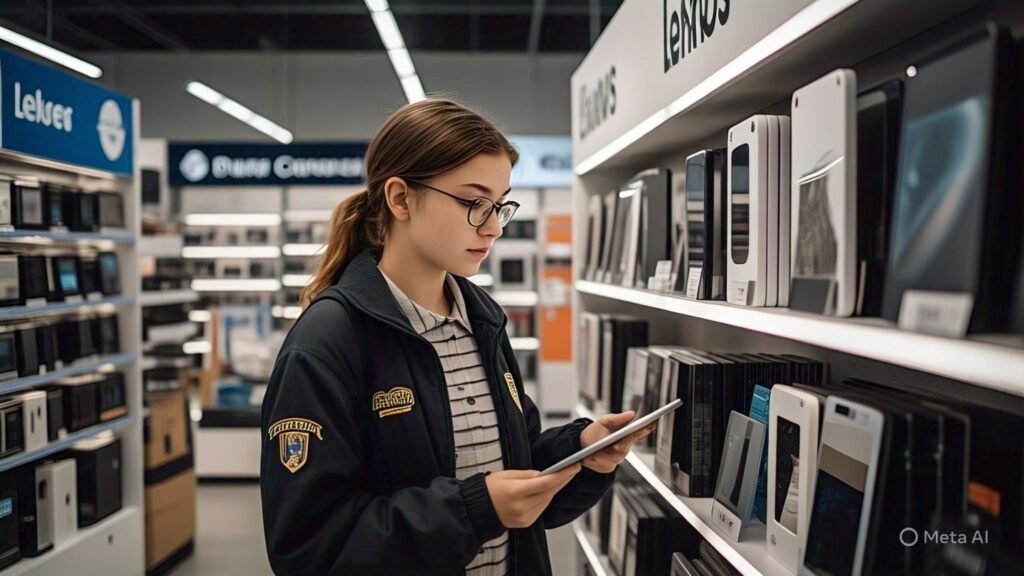Introduction to Student Discounts

In an era where education is closely linked to technology, student discounts have emerged as vital financial aids for learners striving to manage their expenses. With many students operating on limited budgets, access to affordable technology can significantly influence their academic experience. Major brands such as Apple, Samsung, and Lenovo acknowledge this need and offer targeted discounts that help ease the financial burden associated with purchasing laptops, tablets, and other essential devices.
Student discounts serve not only to promote brand loyalty but also to empower young adults to invest in the tools necessary for their education. By offering reduced prices on various products, these companies play a crucial role in making technology more accessible. The growing reliance on digital devices for learning, research, and communication emphasizes the significance of such discounts. As a result, educational institutions increasingly recognize technology as an indispensable component of modern pedagogy.
Apple, known for its innovative software and hardware, has carved out a significant niche in the education sector. Its student discounts often encompass products like the MacBook, iPad, and software bundles that include useful tools such as educational apps and creative programs. Similarly, Samsung’s versatility and range of products appeal to students looking for a reliable and cost-effective option. The brand’s discounts on Galaxy devices and Chromebooks further facilitate students in accessing the technology required for their studies. Meanwhile, Lenovo is recognized for its functional laptops and desktops that are generally designed to cater to educational needs while providing robust performance at student-friendly prices.
As we navigate the landscape of student discounts in 2025, an examination of offerings from these dominant brands reveals both competition and collaboration, ultimately benefiting students nationwide.
Overview of Apple Student Discounts
In 2025, Apple continues to provide substantial student discounts, reaffirming its commitment to making technology more accessible for students. The company extends these offers across a variety of products including MacBooks, iPads, and accessories. Typically, eligible items that benefit from educational pricing include the MacBook Air, MacBook Pro, and iPad models, alongside select accessories tailored for students. This initiative aims to support educational pursuits by enabling students to purchase high-quality devices at more affordable prices.
The percentage of savings available through Apple’s student discount program generally ranges from 10% to 15%, depending on the product. For instance, students can expect approximately a 10% discount on MacBooks while enjoying savings of about 15% on iPads. In addition to direct discounts, Apple often provides bundled offers, which may include options such as free or discounted AppleCare, or the chance to receive accessories like Apple Pencils at reduced rates when purchasing an iPad. This not only enhances the value of the devices but also simplifies the process of acquiring everything needed for an optimal learning experience.
To access these students discounts, individuals must verify their student status typically through a verification service like UNiDAYS or similar platforms. This verification process usually requires students to provide a valid school email address or student identification. Once verified, students have the opportunity to shop Apple’s dedicated educational store online or at authorized retail locations. By ensuring a straightforward verification process, Apple enhances its appeal among students, facilitating easier access to discount pricing and promoting its range of educational tools and technology.
Samsung’s Student Discounts Explained
In the realm of student discounts, Samsung has positioned itself as a competitive alternative to Apple, offering a diverse array of products tailored to meet the technological needs of students. Samsung’s student discount program encompasses a wide range of devices, including laptops, tablets, and smartphones, allowing students to access cutting-edge technology at a reduced price.
For instance, Samsung’s Galaxy Book series, which includes the Galaxy Book Pro and Galaxy Book Flex, is designed to cater to students seeking portable and powerful laptops. These devices typically receive discounts in the realm of 10% to 20% for verified students. In addition to laptops, students can purchase Samsung tablets such as the Galaxy Tab series at a reduced price, enhancing their learning experience through versatility and portability.
Smartphones also feature prominently in Samsung’s offerings. With models like the Galaxy S and Galaxy A series, students can benefit from exclusive pricing, often including significant savings, especially during back-to-school promotions. Discounts on accessories, including noise-canceling earbuds and protective cases, further enhance the value of Samsung’s student discounts.
Furthermore, Samsung frequently introduces special promotions aimed at students. One noteworthy initiative includes trade-in deals, enabling students to upgrade to the latest devices while receiving credit for their existing products. This not only helps alleviate the financial burden of acquiring new technology but also contributes to sustainability by promoting device recycling.
In comparison to Apple’s approach, Samsung’s discounts offer a greater variety of devices catering to different student needs. While Apple primarily focuses on its MacBook and iPad lines, Samsung’s expansive product range provides multiple entry points for students to benefit from educational savings. This strategic positioning allows Samsung to effectively compete with Apple, appealing to a broader spectrum of academic users.
Lenovo’s Discounts for Students
Lenovo has established a reputation for its appealing student discounts, which are designed specifically to meet the needs of educational institutions. In 2025, these discounts continue to be a valuable resource for students seeking affordable technology solutions. Lenovo offers generous price reductions across a myriad of products, ensuring that students can access the cutting-edge devices necessary for their studies.
Typically, Lenovo provides discounts ranging from 10% to 20% on various devices, including laptops, tablets, and accessories. This range is indicative of the company’s commitment to making technology accessible to students, who often face financial constraints. High-demand models such as the Lenovo ThinkPad and Yoga series frequently see mid-range discounts, while entry-level models may even be available at higher reductions, catering to varying budgets.
In addition to competitive pricing, Lenovo also introduces unique programs tailored specifically for students. One such initiative is the Lenovo Education discount program, allowing students to register their school email addresses to gain exclusive access to special promotions, additional savings, and targeted bundles that make purchasing decisions easier. This program not only simplifies the purchasing process but also ensures that students are getting products that are suitable for their academic endeavors.
To qualify for Lenovo’s student discounts, students must verify their status via an approved email address from their educational institution. Once verified, students receive access to Lenovo’s dedicated student store, which features both standard discounts and occasional sales exclusive to student users. This well-structured approach allows Lenovo to maintain accessibility for students while providing reliable products to support their academic success.
Comparative Analysis of Discount Offers
In the competitive landscape of technology, student discounts serve as a vital incentive for educational users. This analysis focuses on the offerings from three major brands: Apple, Samsung, and Lenovo. Each brand attracts students with distinct discount rates, product diversity, and additional perks, tailoring their approaches to meet the needs of young consumers.
Starting with Apple, the brand provides a significant discount of up to 10% on eligible products. This offer encompasses a wide array of items, including MacBooks, iPads, and accessories, making it appealing to students across different disciplines. One of Apple’s unique selling points is their complimentary access to Apple Music and Apple TV+, which adds value to the educational experience. The integration of software and hardware in their ecosystem also attracts students who seek seamless connectivity and user experience.
Samsung, on the other hand, offers a more substantial discount of up to 15% on select laptops and tablets. This discount is not limited to a single product category but extends across various devices, appealing to students who may require different functionalities. Samsung also emphasizes its trade-in programs, which allow students to receive additional financial incentives by exchanging their old devices. The brand distinguishes itself through various promotional bundles that include accessories like earbuds or portable chargers, enhancing the overall budget-friendliness of its offerings.
Lenovo rounds out the comparison with discounts of up to 20% on a diverse range of laptops ideal for students, including Chromebooks and Yoga series. Lenovo’s offer is complemented by incentives such as free shipping and extended warranties, which enhance the overall value proposition. Their focus on customizable configurations also allows students to tailor devices to their specific academic needs.

In sum, while all three brands provide attractive student discounts, the choice ultimately depends on individual needs and preferences, with each offering distinct advantages that cater to students in various fields of study.
Additional Benefits Beyond Discounts
When considering student discounts offered by leading technology companies like Apple, Samsung, and Lenovo, it is essential to recognize that financial savings are not the only advantage these brands provide. Each company goes beyond just offering price reductions; they extend a range of additional benefits that cater specifically to the needs of students, enhancing the overall value of their products.
Apple, for instance, is well-known for its student-focused ecosystem. When students purchase a Mac or iPad, they often receive complimentary access to software such as final cut pro and logic pro, along with a free trial of Apple Music. Furthermore, Apple’s education program includes an extended warranty known as AppleCare+. This coverage ensures peace of mind for students, providing additional support for hardware issues that may arise during their academic journey.
Samsung, on the other hand, bundles various educational resources and practical benefits with its own student discounts. Students who purchase eligible devices may gain access to the Samsung Student Hub, a platform where they can find exclusive discounts on software and subscriptions, such as productivity and design tools that are essential for academic projects. Additionally, Samsung’s customer support is tailored to students, offering dedicated tech support via online chat and phone to solve any arising problems quickly.
Lenovo also values student customers by offering bonus incentives. Their student discount program includes significant savings on premium laptops often coupled with free shipping and an extended return policy, which is particularly beneficial for those trying out new devices. Lenovo additionally offers a robust suite of educational software aimed at enhancing learning outcomes, coupled with resources for online collaboration among peers.
In essence, beyond the immediate financial implications, Apple, Samsung, and Lenovo have created comprehensive benefits that underscore the value of their offerings to students, ultimately contributing to a richer educational experience.
How to Confirm Eligibility for Student Discounts

Obtaining student discounts from major tech brands such as Apple, Samsung, and Lenovo is an attractive option for students seeking to purchase affordable electronics. However, confirming eligibility for these discounts typically requires students to provide proof of their status. Each company has its own procedures that students must adhere to in order to access these benefits.
To begin with, students must gather the necessary documentation. This often includes a valid student identification card issued by the educational institution, a transcript showing current enrollment, or a letter from the school’s registrar office confirming enrollment status. It is essential that the documentation is current and reflects the student’s active status to avoid complications during the verification process.
Once the required documents are compiled, students can visit the official websites of Apple, Samsung, and Lenovo. Each brand offers a dedicated section for student discounts, where instructions for confirming eligibility can be found. For instance, Apple utilizes a platform called UNiDAYS for verification, allowing students to create an account and upload their documentation for review. Similarly, Samsung has its own online verification system where students can submit their documents digitally.
When applying for student discounts, it is important for students to be attentive to the guidelines provided by each company. Tips for ensuring a smooth application process include double-checking that all submitted documents are clear and legible, ensuring they meet the criteria laid out by the respective brands, and submitting applications during peak periods when verification can take longer. Additionally, keeping an eye on communication from the company is crucial to address any queries or issues that may arise promptly.
By following these steps, students can effectively confirm their eligibility for crucial discounts, making the acquisition of necessary technology more financially manageable.
User Experiences and Testimonials
In the realm of student discounts, personal experiences often illuminate the practical value of the offers provided by companies like Apple, Samsung, and Lenovo. For instance, students who have opted for Apple’s education discount frequently highlight the premium product quality alongside a seamless purchase experience. One student noted, “Purchasing my MacBook through the student discount was straightforward, and the additional support I received from customer service was impressive. It truly made the transition to online classes much smoother.” This indicates that Apple’s customer service plays a significant role in enhancing the overall satisfaction of their student-user base.
Conversely, some students have reported mixed feelings about Samsung’s student discounts. While many appreciate the competitive pricing on laptops and tablets, concerns about warranty and service response times have been raised. An engineering major admitted, “I got a good deal on my Galaxy Tab, but when I needed support, I found the wait times frustrating. I wish the process had been more efficient.” This shows that while pricing can attract students, the after-sale experience is equally critical. The overall sentiment reflects a need for improvement in customer support in order to fully maximize the value of the discount offered.
Lenovo appears to have carved out a niche appealing to budget-conscious students. Testimonials point out that the significant savings can lead to positive academic experiences. One student detailed, “The ThinkPad I purchased really meets my needs for programming and has been reliable throughout the semester. The discount helped me invest in a more powerful machine.” This demonstrates that Lenovo’s offerings resonate well with students aiming for utility without overspending.
Real-life insights from students underscore the importance of not only the discounts themselves but also the entire customer experience associated with them. These anecdotes collectively suggest that each of these companies has distinct strengths and weaknesses in supporting student needs, highlighting the necessity for prospective purchasers to consider both pricing and service efficiency when making their selections.
Conclusion: Which Brand Offers the Best Value for Students?
In reviewing the student discount programs provided by Apple, Samsung, and Lenovo, it is evident that each brand presents specific strengths tailored to differing student needs. Apple’s offering remains particularly attractive for students engaged in creative fields, thanks to their seamless integration of software and hardware, along with their substantial student discounts on devices like the MacBook and iPad. The ecosystem that Apple provides enhances productivity through applications geared towards design, editing, and more, ultimately making it an ideal choice for those in creative disciplines.
On the other hand, Samsung has positioned itself as a versatile option for students who prioritize flexibility and multi-tasking. The Samsung Galaxy Book series caters well to those involved in both academic and casual use, offering robust features at competitive prices. Additionally, Samsung’s impressive student discounts on smartphones and tablets make it an enticing choice for tech-savvy individuals who appreciate the value in a unified ecosystem.
Finally, Lenovo emerges as a frontrunner for students seeking functionality and affordability. With its diverse range of laptops, especially within the ThinkPad and Yoga lines, Lenovo has something for everyone from the business-oriented student to the gamer. The generous student discounts available on these powerful devices allow for cost-effective solutions without compromising performance. For students heavily invested in gaming or requiring high processing power for software, Lenovo presents a compelling option.
Considering all factors discussed, the best value for students may ultimately come down to individual needs and preferences. Those focused on creative work may gravitate towards Apple, while those requiring balance between work and play might prefer Samsung or Lenovo. Overall, it is advisable for students to evaluate their priorities and choose the brand that best aligns with their specific academic and lifestyle requirements.


